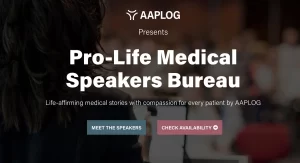Last week, the American College of Obstetricians and Gynecologists (ACOG) launched an advertising campaign titled “Blame the Bans” in which they perpetuated misinformation about state-level pro-life laws. ACOG falsely claims that women were not able to receive the timely care they needed during obstetric emergencies due to these laws.
The campaign includes a thirty-second video, posted on multiple social media platforms, including through paid ads, which describes the case of a woman facing pregnancy complications:
She started bleeding at 19 weeks. Her pregnancy couldn’t continue. The baby wouldn’t survive if she delivered. But the ultrasound showed cardiac activity, so because of the abortion ban, I had to wait. She bled more; she was suffering. She could die. It went against everything I was taught as an OB/GYN. An abortion would have spared her the risk of death and agony. Every day, abortion bans put real people at risk and keep doctors like me from helping them.
This campaign is clearly designed to perpetuate a politically driven narrative that pro-life laws are harming, and even killing, women. First, contrary to the video’s implications, no pro-life law requires that physicians wait to intervene to treat life-threatening pregnancy complications until the ultrasound no longer detects the preborn baby’s heartbeat – which ACOG misleadingly describes as ”cardiac activity,” in keeping with their “Guide to Language and Abortion,” despite the fact that at 19 weeks’ gestation, the human heart has already developed its four chambers. In fact, every state law allows physicians to intervene to treat a serious pregnancy complication even if there is still a fetal heartbeat present.
It is not abortion regulations that prevent timely patient care in case of emergencies; rather, it is misinformation about those laws – the very lies that ACOG is currently disseminating – as well as a lack of clear guidance from hospital attorneys and medical organizations (like ACOG) that is causing physicians to needlessly delay care. AAPLOG has worked with state governments and even published our own online course to provide this kind of guidance; it is unfortunate that the nation’s largest OB/GYN professional organization refuses to do the same.
This is not the first time that ACOG has chosen to spread ideological narratives rather than help the physicians they claim to support to provide quality care to the patients they are committed to defending.
On October 3rd of last year, ACOG published a statement similarly blaming pro-life laws for cases featured in the news of pregnant women not being able to obtain timely emergency care while facing pregnancy complications – some after taking abortion drugs. In this statement, ACOG also endorses completely deregulating the practice of induced abortion, stating,
There is no edit, no amendment, no addendum to these terrible bans that can undo the harm they have created and allow for full access to care. Simply put, abortion bans must be repealed in order to ensure full access to safe, essential reproductive health care for all people. Decisions must be left to patients in consultation with their trusted clinicians, not abortion opponents or laws designed to prevent life- and health-saving reproductive health care. It is the purpose, intent, and effect of these laws to deprive patients of access to safe and reliable reproductive health care. (Emphasis added)
This statement came after AAPLOG published an open letter inviting ACOG to join us in fighting misinformation about abortion laws and abortion drugs following the deaths of two Georgia women from complications of these drugs. It is very possible that false information about abortion drugs and Georgia’s pro-life law may have contributed directly to their deaths.
The little guidance that ACOG has provided has mostly focused on how hospitals can avoid prosecution rather than providing timely care.
It is time to hold ACOG accountable for the harm they are causing physicians and their patients.
Sign this petition to let ACOG know that we demand better – there should be transparency, honesty and room for academic debate. Our colleagues – and most importantly, our patients – depend on it.






